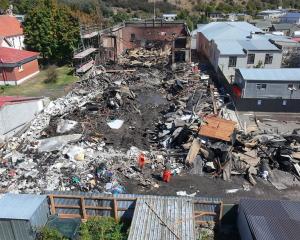A ''highly sensitive'' proposal to open up what are thought to be unmarked graves in historic Central Otago cemeteries and analyse the contents should be rejected to avoid upsetting families, a district council staff member says.
The University of Otago proposal to carry out forensic analysis on unmarked graves at the Moa Creek (Ida Valley) cemetery will be considered by the Central Otago District Council at its meeting on Tuesday.
The project attracted much discussion and some opposition when it was outlined at a March meeting and the council delayed making a decision then.
More background information has been provided for its next meeting and council's parks team leader, Ian Mann, has recommended the proposal be declined ''due to the sensitivity of the project and the strong community association with the historic cemeteries''.
''The risk of upsetting these communities and disturbing the last resting places of individuals is too high to justify approving this proposal for the outcomes stated,'' he said in a report to the council.
In 2013, a report by an archaeologist identified almost 800 possible unmarked graves in Central Otago.
Associate Prof Hallie Buckley and archaeologist Dr Peter Petchey said the project would determine whether those sites were graves and forensically examine the contents, to try to identify the people and build up biographical details on them, substantially adding to the existing historical information on the goldminers and first settlers in the area.
Later, the remains would be reinterred and the graves marked.
They wanted to start at the Moa Creek cemetery and eventually extend the project across the district, focusing on unmarked early graves, such as those in the Drybread and Nevis cemeteries.
Funding was available for the excavation at Moa Creek and they were not seeking any initial funding from the council.
The project is supported by Heritage New Zealand.
Otago-Southland area manager Jonathan Howard said the research would provide valuable knowledge which could be used to manage the sites as well as providing information on the early settlers which could not be gained from historic records alone.
Prof Buckley and Dr Petchey would carry out the work in a ''sensitive manner'', Mr Howard said in a letter to the council.
Mr Mann has told the council a letter of opposition by Rowena Parker-Owens, of Cromwell, was typical of the response the council would receive if it endorsed the proposal.
Mrs Parker-Owens said although a large number of graves were unmarked, descendants were well aware of the location of their loved ones and the graves should not be disturbed.
''I believe that those areas are classed as sacred and man's body and soul belong to God and it is not for us to intervene,'' she said.
Grave matter
Proposal for forensic analysis of unmarked graves:
• Pilot study planned by University of Otago staff
• Starting with Moa Creek cemetery, widen to other Central Otago historic cemeteries
• Aims to find out diet, migration and health of goldminers and first settlers
• Potential for identifying people using DNA and forensic anthropology methods
• Could use facial reconstruction experts to ''build the faces'' of some people
• Information would be marked on graves and remains reinterred












